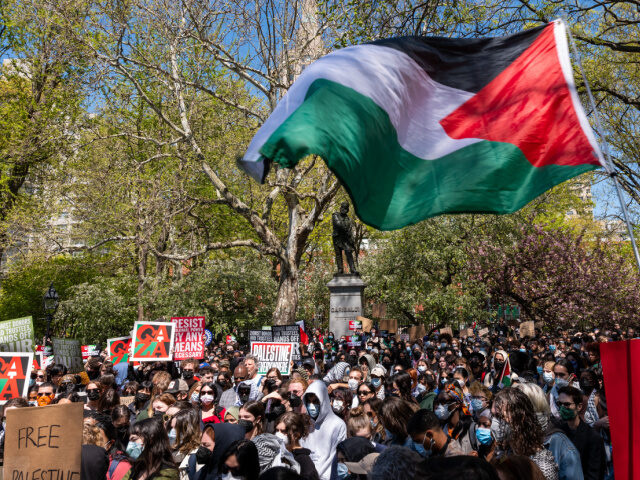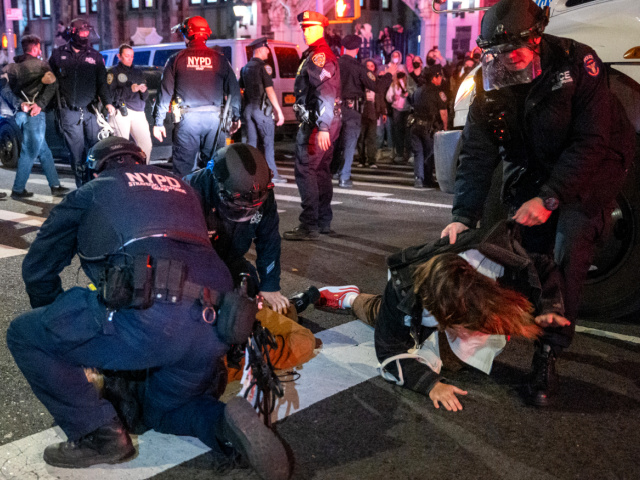
Officials at two universities run by radical jihadist terror entities — Iran’s public Tehran University and the Houthi-controlled Sanaa University in Yemen — offered enrollment this week to students in America and Europe facing disciplinary action for supporting the Hamas terrorist organization.
Violent “encampment” occupations and other disorderly activity has erupted on campuses throughout America, most prominently at universities located in traditionally left-wing areas such as New York’s Columbia University, The University of California – Los Angeles (UCLA), and Northwestern University in greater Chicago.

Columbia University students participate in an ongoing pro-Palestinian encampment on their campus following last week’s arrest of more than 100 protesters on April 26, 2024, in New York City. In a growing number of college campuses throughout the country, student protesters are setting up tent encampments on school grounds to call for a ceasefire in Gaza and for their schools to divest from Israeli companies (Stephanie Keith/Getty Images).
The protesters are opposing Israel’s self-defense actions in the Gaza Strip, Hamas’s stronghold, following the atrocities committed by members of Hamas – including United Nations employees – on October 7. Hamas terrorists killed an estimated 1,200 people, abducted about 250, and engaged in infanticide, gang rape, and widespread torture during that episode, actions the student protesters have not condemned.
The Israel Defense Forces (IDF) entered Hamas-controlled Gaza following October 7 to neutralize the terror group’s ability to repeat the carnage of that attack, angering Hamas allies, such as Iran and Turkey, and prompted international leftist condemnation of Israel, with minimal, if any, recognition of the severity of the October 7 violence.
As of Friday, police have arrested more than 2,000 people for violence and disruptive activity on campuses nationwide. The protests have affected 43 universities so far, according to the Associated Press.

Police arrest protesters during pro-Palestinian demonstrations at The City College Of New York (CUNY) as the NYPD cracks down on protest camps at both Columbia University and CCNY on April 30, 2024 in New York City (Spencer Platt/Getty Images).
Brown University announced on Thursday it would consider divesting from projects in Israel – a core demand of the occupiers – becoming the first university to cede to the protests.
Iran’s Shiraz University, a public institution, announced on Wednesday that any protester in America or Europe facing academic consequences for supporting Hamas could apply for scholarships at Shiraz, also extending the invitation to professors seeking a more pro-jihadist campus. On Thursday, the larger Tehran University made a similar appeal to pro-Hamas Westerners.
“We accept students who have been expelled from European and American universities for protesting against the actions of the Zionists,” Seyed Mahmoud Aghamiri, the dean of Shahid Beheshti University in Tehran, said on Thursday, according to Iranian state propaganda outlet PressTV. “We have considered scholarship for these students and we fully cover the cost of education, dormitory and accommodation.”
Aghamiri said that the invite would especially apply to “Palestinian students whose lives have been affected” by alleged “Israeli aggression.”
Similarly, in Yemen, in remarks to Reuters published on Friday, an unnamed official with Sanaa University offered a place in the institution to Americans suspended from universities for supporting jihadist terrorism.
“We are serious about welcoming students that have been suspended from U.S. universities for supporting Palestinians,” the unnamed official said. “We are fighting this battle with Palestine in every way we can.”
Sanaa University issued a statement this week condemning its American counterparts for “suppression of freedom of expression” by, in some cases, approving police action to remove violent protesters after they threatened others on campus and destroyed property, as well as disturbing the regular final exam season at the end of the semester.
Sanaa University, in the occupied capital, is currently in control of the Iran-backed Shiite terrorist organization Ansarallah, more commonly known as the “Houthis” after the name of the leaders of the group. The Houthis conquered Sanaa, ousting the legitimate government of Yemen, in 2014, launching an ongoing civil war that has forced the government to relocate to the southern city of Aden.
The Houthis have become a critical player in the post-October 7 geopolitical landscape by launching a terrorist campaign in the Red Sea, threatening all ships and other vessels in the region. The Houthis have launched attacks against dozens of vessels, many of them commercial ships with no significant ties to Israel and, in some cases, ties to Houthi allies such as Iran, Russia, and China.

A screen grab captured from a video shows that cargo ship “Galaxy Leader” co-owned by an Israeli company, being hijacked by Iran-backed Houthis from Yemen in the Red Sea on November 20, 2023 (Photo by Houthis Media Center / Handout /Anadolu via Getty Images).
Both the Houthi terrorists and the government of Iran, which backs the Houthis, are extremely repressive entities, particularly targeting potentially defiant youth. Iran has seen the eruption of student protests against its radical Islamic regime repeatedly in the past decade, most recently experiencing a wave of protests following the killing by Iran’s “morality police” of Mahsa Amini, a 22-year-old woman detained for allegedly not wearing her hijab appropriately.
Human rights groups estimate that Iranian authorities have killed over 500 people, many of them students, for protesting in Mahsa Amini’s name. At least 70 of these are believed to have been children.
In Yemen, the major intervention the Houthis imposed on Sanaa University was also targeting the freedom of women on campus. In July, Houthi terrorists forced the university to segregate class schedules so that male and female students are not on campus at the same time.
“Male students will now be required to report to the college on Saturdays, Sundays, and Mondays, while female students must attend on Tuesdays, Wednesdays, and Thursdays, according to a decision circulated by the college’s Houthi-backed students’ union,” Arab News reported in July.
The outlet quoted Houthi leader Mohammed Ali Al-Houthi calling the move “in accordance with the female students’ desires, as they possess modesty, pride, and elevated Islamic values.”
